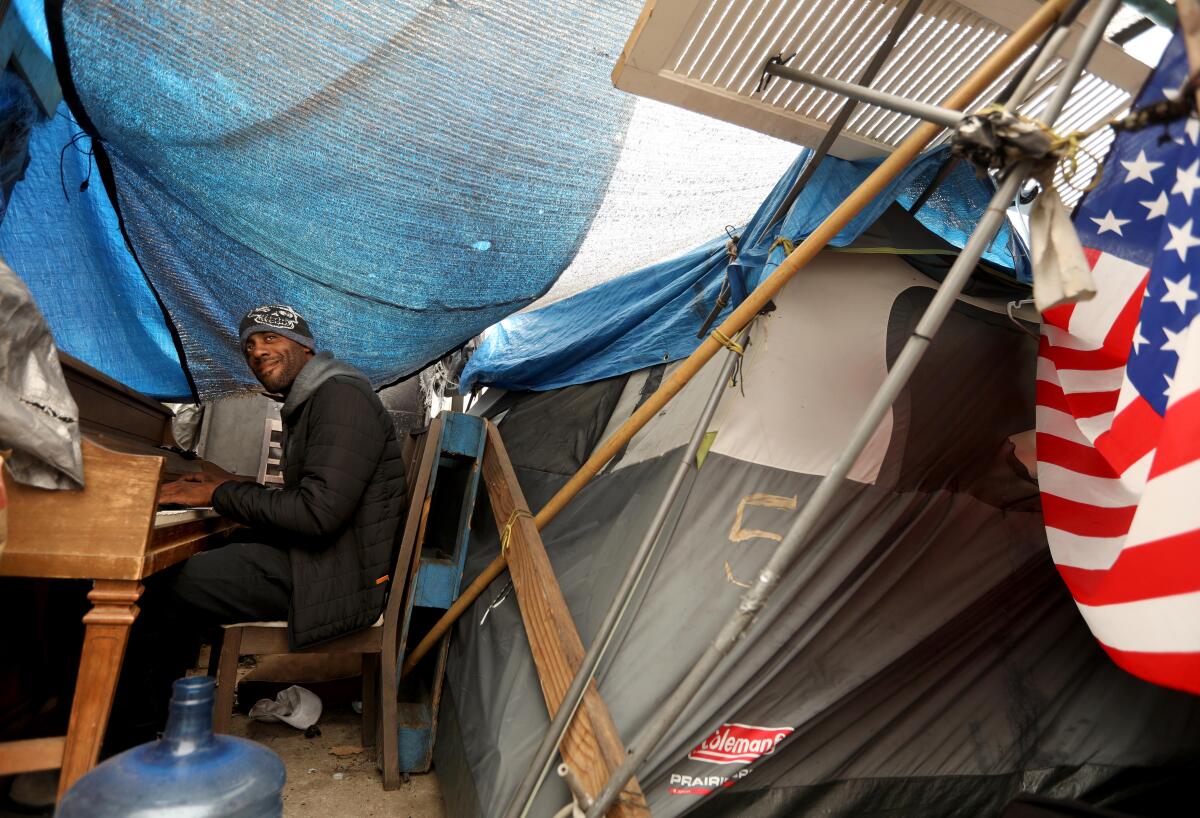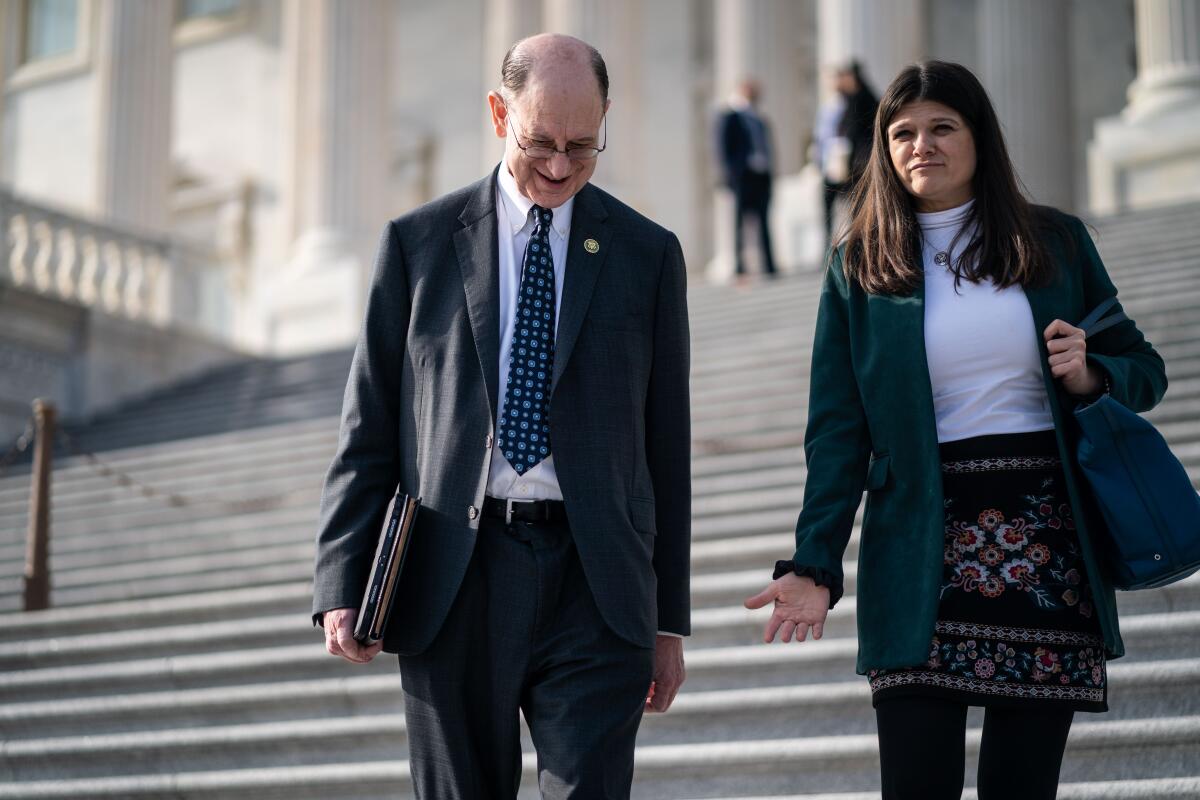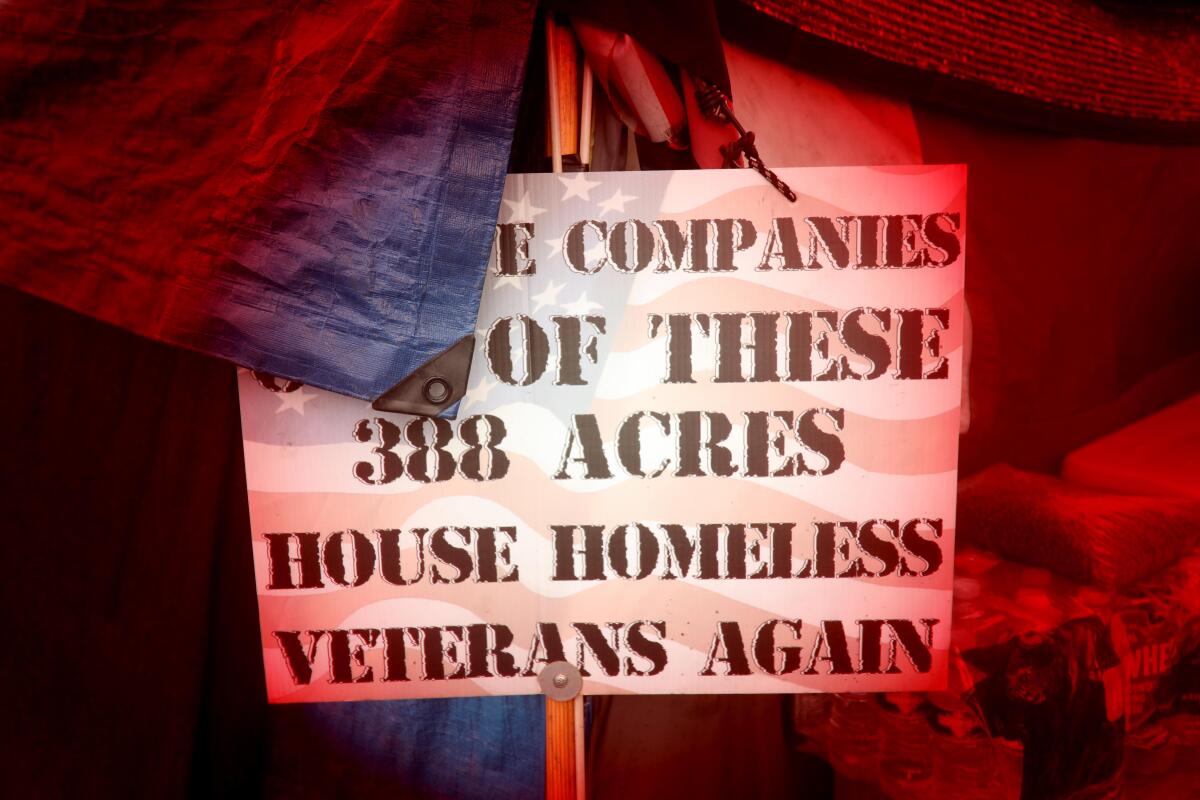
In response to months of pressure from veterans advocates and elected officials, the U.S. Department of Housing and Urban Development announced Thursday that it will change a widely criticized rule that excludes the most disabled veterans from subsidized housing designed for them.
The rule, which HUD officials previously said they could not change, treats service-connected disability benefits as income. That compensation, based on the veteran’s disability percentage up to 100 percent, can increase a veteran’s income above the maximum allowed for low-income housing.
“The days of a veteran having to choose between the VA benefits they deserve and the housing assistance they need are finally over,” VA Secretary Denis McDonough said in a statement. “This is a critical step that will help veterans across the country and bring us closer to our ultimate goal of ending veteran homelessness forever.”

Iraq War veteran Lavon Johnson, 35, plays piano in his tent along Veterans Row along San Vicente Boulevard in an unincorporated area near Brentwood on Oct. 30, 2021. Johnson was stationed at Fort Hood and deployed to Iraq in 2006 and 2007 and has been living homeless on Veterans Row for about a year.
(Genaro Molina/Los Angeles Times)
“It looks like we’ve won a hell of a victory,” said Rep. Brad Sherman (D-Northridge), who introduced a bill to change the rule but also pushed former HUD Secretary Marcia Fudge to find a faster solution.
“Veterans who have served our country should never have to choose between housing and their disability benefits,” said Mayor Karen Bass, who pushed for the change. “I am grateful to the Biden-Harris administration and the many leaders who helped implement this important policy change that will save lives and give more veterans access to permanent housing.”

Rep. Brad Sherman (D-Northridge) and Rep. Haley Stevens (D-Mich.) talk as they walk down the steps of the House of Representatives building at the U.S. Capitol on January 12, 2023.
(Kent Nishimura/Los Angeles Times)
In a class-action lawsuit filed by veterans over a series of complaints against the VA, U.S. District Judge David O. Carter ruled in May that the policy discriminated against disabled veterans. “Those who have given the most cannot receive the least,” he wrote.
HUD’s announcement comes on the third day of a nonjury trial in the Los Angeles lawsuit that was partly to determine what remedy Carter would order to end discrimination.
“This change is welcome, but it should have been enacted years ago,” said Mark Rosenbaum, an attorney at Public Counsel and the attorney in the veterans’ lawsuit. “It shouldn’t take a trial and a federal judge’s ruling that a cruel and senseless policy that has kept our most disabled veterans on the streets instead of housed is unlawful and discriminatory.”
Long a source of frustration and anger among veterans, the issue gained political momentum as new housing was built on the U.S. Department of Veterans Affairs campus in West Los Angeles and veterans living in a small hometown there learned they were ineligible because their incomes exceeded the limit for veterans’ subsidies called HUD VASH vouchers.
In January, Sherman questioned Fudge at a congressional hearing, saying that while he was pushing for legislation, he believed the solution did not require changing the law.
“Your department is more functional than Congress,” Sherman told Fudge. “So I hope that instead of turning to us and saying, ‘Here’s what we should do,’ I can turn to you and say, ‘Here’s what you can do.’”
“If I could do it today, I would,” replied Fudge, who retired in March.
Sherman blamed the eight-month delay on bureaucracy, but said he believed a conversation he had with acting secretary Adrianne Todman helped.
“I think it has evolved further,” he said.
Bass also lobbied Todman to change his membership status with the U.S. Conference of Mayors. In April, more than 50 mayors from across the country raised the issue in meetings with key members of the Biden administration, the U.S. Senate and the U.S. House of Representatives.

A sign in support of housing for homeless veterans rests outside a tent on Veterans Row along San Vicente Boulevard in West Los Angeles on October 30, 2021.
(Genaro Molina/Los Angeles Times)
HUD also made $20 million available for additional administrative funding to 245 public housing agencies in 43 states to expand their housing search assistance to support veterans, expand recruitment of landlords to the program, provide incentives and retention payments, assist veterans with security deposits, and provide landlord-tenant mediation activities.
The new policy also requires public housing agencies that administer HUD-VASH vouchers to set veterans’ income eligibility at 80 percent of the area median income, up from 50 percent typically. This expanded eligibility will help house more veterans.
Under the new policy, disability benefits will still count as income for the purpose of calculating how much a veteran must pay for rent, but not for eligibility. Tenants of subsidized housing are required to pay 30 percent of their income in rent.
Sherman said he kept the rent calculation out of his bill because a change would have budgetary implications that would make it more difficult to pass.
“I wanted to deal with eligibility first and then come back to the rent calculation,” he said.
Sherman said he believes the policy change is better than a U.S. district court ruling because it is not subject to appeal.


